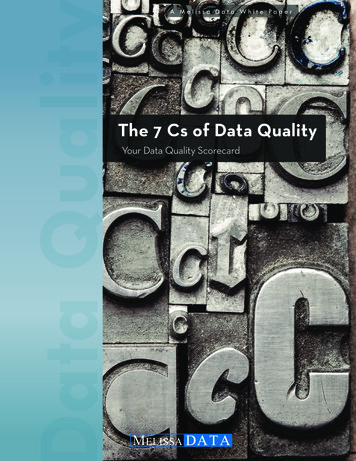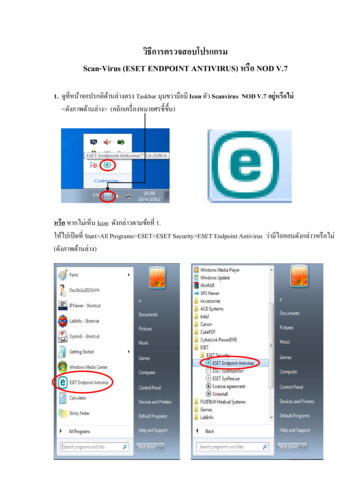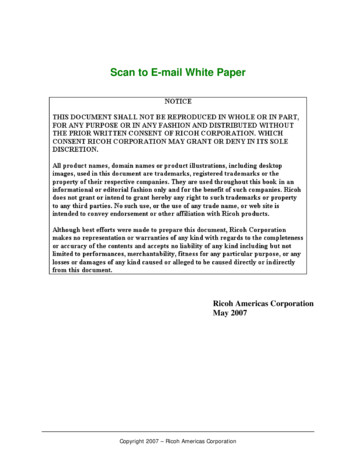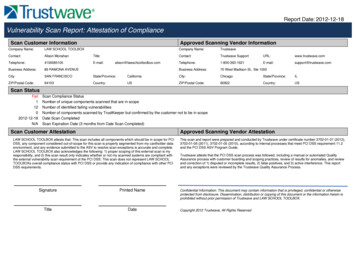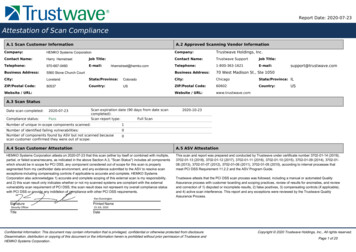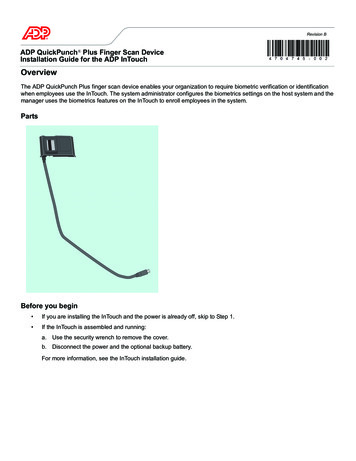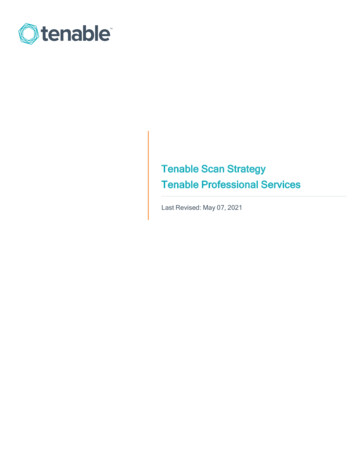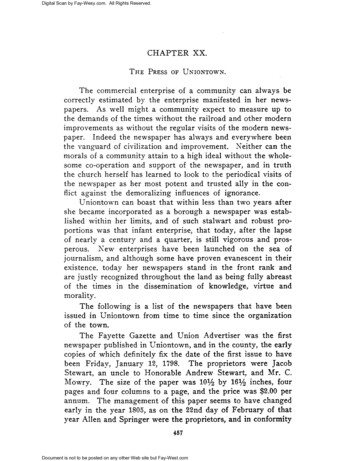
Transcription
Digital Scan by Fay-Wesy.com. All Rights Reserved.C H A P T E R XX.T h e commercial enterprise of a community can always becorrectly estimated by the enterprise manifested in her newspapers. As well might a community expect to measure up tothe demands of the times without the railroad and other modernimprovements as without the regular visits of the modern newspaper. Indeed the newspaper has always and everywhere beenthe vanguard of civilization and improvement. Neither can themorals of a community attain to a high ideal without the wholesome co-operation and support of the newspaper, and in truththe church herself has learned to look to the periodical visits ofthe newspaper as her most potent and trusted ally in the conflict against the demoralizing influences of ignorance.Uniontown can boast that within less than two years aftershe became incorporated as a borough a newspaper was established within her limits, and of such stalwart and robust proportions was that infant enterprise, that today, after the lapseof nearly a century and a quarter, is still vigorous and prosperous. Kew enterprises have been launched on the sea ofjournalism, and although some have proven evanescent in theirexistence, today her newspapers stand in the front rank andare justly recognized throughout the land as being fully abreastof the times in the dissemination of knowledge, virtue andmorality.T h e following is a list of the newspapers that have beenissued in Uniontown from time to time since the organizationof the town.T h e Fayette Gazette and Union Advertiser was the firstnewspaper published in Uniontown, and in the county, the earlycopies of which definitely fix the date of the first issue to havebeen Friday, January 12, 1798. T h e proprietors were JacobStewart, an uncle to Honorable Andrew Stewart, and Mr. C.Mowry. T h e size of the paper was 10% by 16% inches, fourpages and four columns to a page, and the price was 2.00 perannum. The management of this paper seems to have changedearly in the year 1805, as on the 22nd day of February of thatyear Allen and Springer were the proprietors, and in conformityDocument is not to be posted on any other Web site but Fay-West.com
Digital Scan by Fay-Wesy.com. All Rights Reserved.458History of Uniontown, Penasylvanio.to the patriotic spirit of the times, they prefixed the name ofGenius of Liberty and the name became The Genius of Libertyand Fayette Advertiser, and bore the date of Friday, February22, 1805.James Allen, one of the proprietors, served as sheriff ofthis county from October 28, 1802 for a period of three years.Zadoc Springer, the other proprietor, was the father of the lateJonathan D. Springer, Esq., and was a man of considerableintelligence.How long Allen and Springer continued as proprietors ofthe paper is uncertain, but the issue of Saturday, January 28,1809, shows that Jesse Beeson had become proprietor, havingas the motto of the paper, " Here shall the press the people'srights proclaim, With truth its guide, the public good its aim."Jesse Beeson was the oldest child of Henry Beeson, the founderof the town, and was brought here, a babe, when his parentssettled west of the mountains. He conducted the paper untilabout 1816, when the issue of Wednesday, November 27, of thatyear shows that Samuel Littell had become the proprietor.Samuel Littell was the son of Job Littell who was of FrenchHuguenot parentage and settled in what is now South Uniontownship in 1783, and erected and operated a mill a short distance south of the Hutchinson reservoir of the Uniontown Watercompany. Samuel Littell was the author of the verses on thetragic death of Polly Williams, who was killed by her deceivera t the White Rocks, August 14, 1810. These verses attained awide reputation, and were repeatedly published in the newspapers. It appears that the paper reverted back t o Jesse Beesonas his name again appeared a t the mast head. John Bouvier andJohn M. Austin succeeded Jesse Beeson as proprietors of thepaper, and changed its name to that of The Genius of Libertyand American Telegraph. The first issue under this newproprietorship was dated Saturday, April 11, 1818, Vol. I, No. 1.John Bouvier was a native of France and came with his parentsto America when quite young and learned the printing tradewith Benjamin Johnson, and later settled a t Brownsville wherebe published the American Telegraph from 1814, until he consolidated that paper with the Genius of Liberty. A fuller account of Mr. Bouvier will be found in the chapter on the Benchand Bar. John M. Austin became a leading attorney at the bar,in the notice of which he will receive a more extended notice.Document is not to be posted on any other Web site but Fay-West.com
Digital Scan by Fay-Wesy.com. All Rights Reserved.History of U ziontown,Penn ylva nia.459Thomas Patton succeeded Bouvier and Austin in theownership of the paper, and his first issue was Tuesday, July25, 1820, Vol. I, No. 1. Mr. Patton was a practical printer andthrew all his energies into the work, made many innovationsfor the improvement of the paper; but in the issue of April 22,1523, Mr. Patton announced the discouraging fact that " duringthe present editor's incumbency he had not received so muchcash on subscription as would pay for the paper on which theGenius was printed; and that wheat, rye, oats, corn, wool, flax,iron, feathers and wood ashes would be taken in pay a t marketprices." Mr. Patton, however, persisted in his endeavor to improve his paper; but again, in the issue of December of thesame year he was obliged to announce the discouraging factthat " nearly six months have elapsed since we enlarged oursheet, but have received only two dollars for our expenses andtrouble. Can we, we would ask any honorable man, carry onat this rate, by receiving only two dollars for six months'labor? " H e again offers to take country produce in paymentof subscription. Mr. Patton stood high in the esteem of thecommunity, and was captain of the company of Lafayette Artillery, in 1827. H e removed to Steubenville, Ohio, where heworked at his trade until quite an old man.William H. Whitton and Colonel William Redick succeededThomas Patton in the ownership of the paper. The first issueunder this ownership was Wednesday morning, December 3,1828, under the name of Genius of Liberty and Fayette andGreene Advertiser. Mr. Whitton was the proprietor of theGreene County Advertiser, a t Waynesburg when that paperand the Genius were consolidated, hence the name of the consolidated papers. T o illustrate the little attention given tolocal news by papers of that date, the following is quoted fromthe.issue of June 28, 1830: " General Jackson, president of theUnited States arrived in this place Wednesday evening, June21, 1830, and took lodging a t the stage office." This was an innovation which, doubtless, the editor thought the importance ofthe occasion would justify, and the head of this great nationcould feel complimented that his visit was the occasion of a twoline local in the Genius of Liberty. It was the custom to issueno paper the week on which the 4th of July fell, and in 1830that date fell on Sunday and Saturday was observed as a dayof jollification, and as there were several demonstrations held onDocument is not to be posted on any other Web site but Fay-West.com
Digital Scan by Fay-Wesy.com. All Rights Reserved.460History of Uniontown, Pennsylvania.that day, the accounts were not published until the issue of the12th. One address which had been delivered on the occasionof the 4th was published in full, but not until fifteen monthsafter the date of its delivery. Times have changed.Whitton and Redick issued the paper from a frame carpenter shop which stood on the corner of Bank alley and Southstreet, then the property of Col. Redick. On December 15,1830, Col. Redick sold out his interest in the paper, having beenconnected therewith exactly two years, and Mr. Whitton became sole owner. Mr. Whitton's wife was a daughter of DavidEwing, a well known druggist of the town, and after his disconnection with the Genius of Liberty he became associatedwith Alfred Patterson, Esq., in the publication of The AmericanBanner and Literary and Temperance Journal.Alonzo L. Littell succeeded William H. Whitton in theownership of the Genius of Liberty, January 11, 1832. He foundthe material and conveniences of the establishment the mostprimitive and crude: the types were worn out, and the presswork was done on an old Ramage press. T h e forms were inkedby sheep-skin pads and a good pressman could throw off butthree sheets in two minutes. Mr. Littell put new life into thepaper; adding new material and introducing improved machinery. H e dropped the iatter part of the name of the paperand restored it to simply T h e Genius of Liberty. The issueof April l l t h , of the above year, shows that Mr. Littell had associated with him in the editorship, Mr. Thomas Patton, aformer editor of the paper. This partnership, however, lastedbut a few months and Mr. Littell assumed full ownership, business manager and editor a t the early age of twenty-two years.H e was the son of Samuel Littell to whom reference has alreadybeen made as being proprietor of the paper for a short time,and a grandson of Job Littell before mentioned. H e was a manof small stature, but quick in motion, and possessed a retentivememory. H e was very popular as a gentleman and able as aneditor.I n 1836, the Democratic Shield, which had been startedby James Piper, was absorbed by the Genius of Liberty, andthe two names were united, and Justin Morris, who was abrother-in-law to Mr. Littell, became interested in the combinedpaper. Mr. Littell in writing from Cleveland, Ohio, September10, 1883, to the editor of the Genius of Liberty, says: " At theDocument is not to be posted on any other Web site but Fay-West.com
Digital Scan by Fay-Wesy.com. All Rights Reserved.History of Unionto-m, Pennsylvania.461early age of 22 years I became editor of the Genius of Liberty,which position I occupied until 1840; was a merchant from 1840to 1851, a farmer from 1851 till 1874, in the fire insurance businessfrom 1874 till 1883. Always, and in all things, successful andcontented, and now a t 75 years of age I send my photograph andsalutations to the editorial chair of the old Genius of Liberty,which I filled 52 years ago." Mr. Littell died a t his home inCleveland, Ohio, February 5, 1884, in the 76th year of his age.John Irons succeeded Alonzo L. Littell in the ownershipof the Genius of Liberty, and began a new series Monday, April13, 1840. H e continued its publication until in April, 1846, whenhe transferred it to John W. Shugart who issued his first numberThursday, April 9th, but his interest in the paper terminatedMarch 1, 1847, and Mr. Irons again resumed ownership. Mr.Shugart was appointed assistant commissary of the 2nd Regiment Pennsylvania Volunteers, with the rank of captain, andwent with his regiment to the Mexican war. Mr. Irons associated with- him in the publication of the paper his son-in-law,John W. Skiles. John Irons came to Uniontown from Waynes-,burg where he had been the proprietor of the Waynesburg Messenger, and immediately purchased the Genius of Liberty, andrefurnished the office. When the cholera visited this town Mr.Irons fell a victim to that terrible plague and died July 30, 1850,in the 46th year of his age. H e was the first Master of Fayettelodge, No. 228, F. and A. M., which lodge erected a monumentto mark his grave in token of the esteem in which he was heldby that lodge.John W. Skiles, in conjunction with Mrs. Irons, conductedthe paper a short time after the death of Mr. Irons, when theysold it to Robert T. Galloway, Esq., who held it for about twomonths, when it was sold to Thomas B. Searight and Armstrong Hadden. This firm started a new series, the first issuebearing date of Thursday, October 31, 1850. During this proprietorship Charles E. Boyle, who subsequently became a distinguished attorney and jurist, was an apprentice in the office and made his home with Mr. Hadden, where he became asone of the family. Mr. Hadden retired in January, 1852, and Mr.Searight conducted the paper alone until April E t h , when G.W. K. Minor obtained a half interest.On January 1, 1853, Mr. Searight retired and Mr. Minorbecame sole owner. H e too hailed from Waynesburg and wasDocument is not to be posted on any other Web site but Fay-West.com
Digital Scan by Fay-Wesy.com. All Rights Reserved.462History of U iontozpm,Pennsylvania.a practical printer. Mr. Minor, like many others, had his upsand downs in journalism. In his issue of October 13, 1853, is thestatement that " the cash expenses of the office are 30 per week.Few persons have any idea of the expenses of running a newspaper, hence our necessity of dunning our delinquent subscribers." There was no issue of the paper for the week of August24, 1854, as the editor states " o n account of too much jobwork." There were no issues for the weeks of November 30and December 7 ,1854, "on account of having no paper. Themelting of the late snows has raised the streams and startedthe mills, and we now have a promise of enough to keep usgoing."There was a rival Democratic paper published in the townduring Mr. Minor's ownership of the Genius of Liberty, andsome controversy arose between the editors of the two paperswhich resulted in a fisticuff encounter in which a brother ofthe rival editor also took a part, but Mr. Minor put both of hisassailants to route. The issue of December 28, 1854 containedMr. Minor's valedictory; the paper having been conducted byhim for two years and nine months.John Bierer succeeded Mr. Minor in the ownership of thepaper, January 1, 1855, and conducted it until in February, 1856,when he disposed of it to Armstrong Hadden and C. E. Boyle,and Mr. Hadden immediately disposed of his interest to ThomasB. Searight. The paper was thus conducted until the fall of1860, when Mr. Searight retired and Mr. Boyle assumed fullownership.Colonel Edward G. Roddy purchased the paper from Mr.Boyle, February 1, 1861, and hoisted as the motto of the paper," T h e Union and Equality of the States." Mr. Roddy's editorship was during the most trying times in the history of thepaper. The war of the rebellion came on and the whole countrywas thrown into turmoil. Every one became radical in hispolitical opinions, but Mr. Roddy being of a quiet, peaceabledisposition, maintained conservative views in his paper, forwhich he was severely censured. He was the recipient of manyanonymous letters in which the destruction of his office wasthreatened, but an armed guard at the office prevented thesethreats from being executed.The issue of February 19, 1863, contains Mr. Roddy's valedictory in which he states that he has been the proprietor ofDocument is not to be posted on any other Web site but Fay-West.com
Digital Scan by Fay-Wesy.com. All Rights Reserved.History of Uniontown, Pennsylvania.463the paper for two years, and he now sells out to R. B. Brown,late editor and proprietor of the Brownsville Times, and Mr.Brown consolidates the Times with the Genius of Liberty. Mr.Brown issued two numbers of the paper only and it revertedback to Mr. Roddy.Mr. Roddy was born in Addison, Somerset county, Pa., June12, 1824, and was engaged in the mercantile business for manyyears. H e was of a quiet, dignified and unassuming dispositionand a perfect gentleman in every respect. H e died at his homeon East Main street, on his birthday, June 12, 1867, aged 43years.Mr. C. E. Boyle, as administrator of the estate of Mr. Roddy,sold the Genius of Liberty to James F. Campbell and FrederickS. Rock on August 1, 1867, Mr. Boyle in the meantime havingconducted the paper himself.Mr. Campbell spent nearly all his life in newspaper work.He, subsequent to his connection with the Genius of Liberty,became editor of the Johnstown Democrat, and about 1881, hesecured a position in the Treasury Department a t Washington,D. C., where he was employed until stricken down with paralysis, from the effects of which he died July 25, 1899.Albert M. Gibson succeeded Campbell and Rock as proprietor of the paper, and Vol. I, No. 1, under his ownershipwas dated January 16, 1868. Under his ownership steam powerwas first used for the press work. H e threw new life into thepaper, and was the first editor in the county to introduce thegathering of local news from over the county. Mr. Gibson metwith such unbounded success as a newspaper man that he determined to enter a wider field and started a daily paper inPittsburgh. With the assistance of friends he started a dailypublication known as " T h e Paper," and Vol. I, No. 1was datedThursday, December 1, 1870, with the office of publication a tNo. 19, Fifth avenue. There was a promise that a weekly edition of " T h e Paper" would be issued on or about January 1,1871, but the expense of the daily soon consumed the funds ofthe firm, the weekly never appeared and the daily lasted onlya few weeks. This failure also involved Mr. Gibson's interestin the Genius of Liberty, and the paper was subjected to sheriff'ssale in April of 1871, and was bought by Messrs. Daniel Kaine,C. E. Boyle, William H. Playford and George W. Litman.After his disconnection from the Genius of Liberty Mr.Document is not to be posted on any other Web site but Fay-West.com
Digital Scan by Fay-Wesy.com. All Rights Reserved.464H W y of Uniontown, Pennsylvania.Gibson became the Washington City correspondent for the NewYork Sun, which position he filled with marked ability for twelveyears. H e subsequently went to London, England, and becameengaged on the Pall Mall Gazette, and was also correspondentfor the New York Sun from that city. He died in LondonMarch 22, 1899.I n the summer of 1871, Captain William A. McDowell purchased a one-third interest in the paper, the other partners beingGeorge W. Litman one-third and Messrs. Kaine, Eoyle andPlayford the remaining one-third. I n 1875, Kaine, Boyle andPlayford sold their one-third interest to Albert Marshall; thefirm becoming Litman, McDowell & Co. Captain McDowell retired from the firm November 10, 1581, and the firm becameLitman and Marshall, and after eleven years' connection withthe paper, Mr. Litman retired in 1882.A history of the Genius of Liberty without a personal sketchof Charles E. Boyle, as a printer, would be as defective as " theplay of Hamlet with Hamlet left out."Charles E. Boyle was born in Uniontown, February 4, 1836,and a t the early age of nine years began the setting of type foramusement in the office of Robert Jones who was a t that timepublishing the Cumberland Presbyterian in Campbell's row onPittsburgh street, in the room subsequently occupied by theGenius of Liberty. At this early age he was obliged to standon an empty candle box to enable him to reach the cases. Atthe age of fourteen he went to the trade, and at sixteen hebecame foreman of the Steubenville Herald, where Thomas Patton, a former editor of the Genius of Liberty, and now quite anold man, was working a t the case in the same office. H e becamean able journalist as well as a profound jurist.Ash. F. Hill, who will be remembered as the author ofseveral creditable works of fiction, was employed as local editoron the Genius of Liberty in 1875-6, and his spicy articles soonbecame an attractive feature of the paper.On June 8, 1882, the plant was put up a t public sale, andMr. Marshall became the purchaser, and associated with himMr. Frank Higgins of Pittsburgh, who became half owner of thepaper and its chief editor; he having been city editor of thePittsburgh Post for several years past. During this ownershipS. L. Mestrezat, Esq., now a member of the supreme court ofPennsylvania, was financially interested in the paper.On March 15, 1883, the office was again sold at public out-Document is not to be posted on any other Web site but Fay-West.com
Digital Scan by Fay-Wesy.com. All Rights Reserved.History of Unio
John M. Austin became a leading attorney at the bar, . Alonzo L. Littell succeeded William H. Whitton in the ownership of the Genius of Liberty, January 11, 1832. He found . and Justin Morris, who was a brother-in-law
